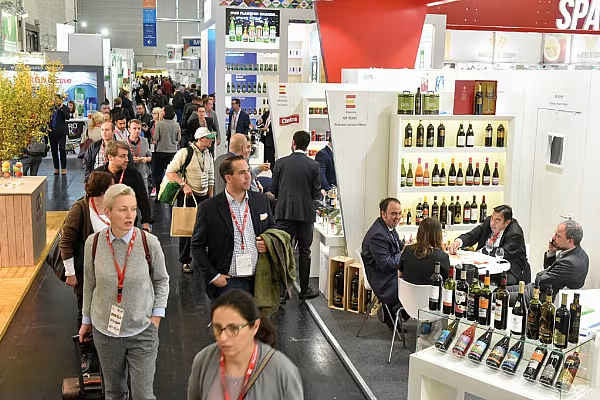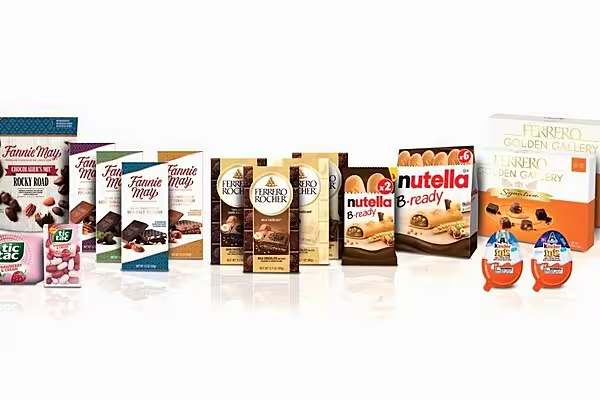There’s arguably no more appropriate setting for Anuga than Germany, the third-biggest food exporter in the world. Ahead of the event, the Federation of German Food and Drink Industries (BVE) has published a major report on German food trends. Additional reporting by Larissa Zimmer.
Anuga will welcome more than 160,000 national and international top decision-makers from across the global food and retail spectrum, and with this in mind, the event represents an unmissable opportunity for domestic companies to promote themselves.
The Bundesvereinigung der Deutschen Ernährungsindustrie (BVE), or Federation of German Food and Drink Industries, will be among the groups promoting the ‘Made in Germany’ seal of approval at Anuga 2017, alongside the German Ministry for Food and Agriculture (BMEL). Ahead of the show, the BVE has published a report on international trends, Global Food Trends: Enjoyment with Individual Added Value, with particular focus on how these trends are affecting German consumers.
Global Focus
Internationally, a growing population and increased urbanisation are leading to significant changes in food consumption, the report finds. Convenience is a key trend, while increased demands for quality and quantity are putting pressure on supply chains. This means that, as productivity is increasing, improved efficiency and sustainability along the food chain is also necessary.
Also, on the consumer side, awareness of the ‘value’ of food is growing, with campaigns about the avoidance of food waste now a global trend.
Closer to home, the high purchasing power and high standards expected by around 510 million consumers make the European Union an attractive sales market for food producers worldwide.
In terms of the main market drivers for European citizens, taste continues to be the most important quality criterion, however, the consumer is also increasingly demanding constant innovations, as well as an ever-wider range of products. Offering additional taste profiles and refining product ingredients comprise more than 50% of the innovations within the industry.
In addition, products need to correspond with the everyday and dietary needs of customers, the report reads. The strong trend towards convenience products has been overtaken in recent years by consumers’ increased orientation towards health. Allied to this, an emerging trend with great potential is the consumer demand for sustainable foods, with the focus on transparency and responsibility towards the environment and employees.
Germany In Focus
With more than 81 million consumers, Germany is Europe’s largest food market. Consumer confidence in Germany is at a positive level, lying significantly above the European average. However, according to the BVE report, Germans spend 10.5% of their disposable income on food and non-alcoholic drinks, which puts them well below the European average in this regard. This compares to 12.5% in France, 13.4% in Italy, 16.9% in Portugal, and as much as 29.4% in Romania. In Germany, a single-person household spends, on average, €159 a month on food and drinks, with a four-person household spending €500 on the same.
However, it is important to take the relatively high income level in Germany into consideration here. Adjusted for price, spending on food and non-alcoholic drinks increased by 1.6% in 2016, when compared to the previous year.
In addition, in 2017, the average German citizen will have around €22,239 at his/her disposal for consumer spending and living costs. That is around €360 more than in 2014.
Industry Breakdown
The most important industry branches within the German food sector are, somewhat unsurprisingly, meat and meat processing (24.3% share of the total food industry turnover), milk and dairy products (13.2%), bakery products (9.8%), confectionery (8.3%), alcoholic beverages (7.6%) and processed and canned fruit and vegetables (6.1%). At the other end of the spectrum, just 1.2% of spend goes on fish and fish products, and 0.3% on pasta.
However, despite these largely traditional categories holding sway, BVE reports that around 40,000 new products enter the market each year, seeking to tap into emerging consumer trends. These include superfoods, vegetarian, vegan, gluten- and lactose-free products, light and convenience products, as well as products with special production features, such as regional, sustainable, Fairtrade and organic products. Within these categories, the product portfolio is continually further specialised, differentiated and reinvented, faster and faster.
This annual new-product explosion comes despite German consumers going shopping a good 20 times less often per year than they did four years ago. Customers buy less and less frequently, but instead buy higher-quality food.
Some 27% of German consumers are regular purchasers of sustainable food, according to BVE, and these shoppers typically spend 16% more than regular shoppers. Allied to this, German food manufacturers are increasingly competing for the trust of their customers, as information on origin, production methods and sustainability gains prominence.
Another important trend is the change in the types of households, mealtimes and diets, which have to adapt to suit everyday professional lives. As a result, one quarter of consumer expenditure for food is currently spent on out-of-home meals. A large majority of the Germans simply don’t have the time, skill or will to prepare the food themselves. As BVE states, just 34% of German consumers cook regularly.
Thus, retailers are also positioning themselves to take advantage of this out-of-home trend, with increased ranges in categories such as bakery products, sandwiches, coffee, craft beer, premium meats and ready meals.
Food Exports
Germany is the third-largest importer and exporter of food in the world, and the largest in Europe. The food industry employs 581,000 employees in around 6,000 businesses, together generating €172 billion in annual sales. The most important trading partner, with an export share of 78%, is the EU, followed by Asia, which accounts for 8.8% thereof. In 2016, according to BVE, ‘Made in Germany’ food products to the value of €57 billion were exported abroad, which corresponds to every third euro of the total turnover of the sector.
Building on the strong reputation for German products within the EU, opportunities for growth further afield are also promising, and some 80% of manufacturers already export their products to non-EU countries. As they are discovering in non-EU countries, the origin of products plays an important role, and according to BVE, this is where German producers have a competitive advantage over their competitors.
Understanding Food Trends
As a key exporter, and, indeed, influencer, Germany is home to a rich and varied food-trend matrix, which will be explored in more detail by BVE at Anuga 2017.
Here, ESM explores some of the biggest overarching trends and the subdivisions having the most influence at present, particularly among some of Germany’s biggest retailers.
Vegan
With 1.3 million people in Germany describing themselves as vegans, foods suitable for a plant-based diet are becoming increasingly popular. The Edeka Bio + Vegan brand was launched in 2015 and currently features more than 50 different products, including vegan sausage specialties, soy products and everyday basics.
Next to dairy alternatives such as almond milk and soy yoghurt, Edeka also offers a range of vegan spreads with unusual flavours, such as Shiitake-Champignon and Papaya-Curry, among others. Additionally, Edeka provides consumers with meat substitutes, such as soy-fillet steaks and soy nuggets, for fast and easy preparation at home.
Elsewhere, Mössingen-based company Wheaty has developed a range of seitan-based meat substitutes, to tap into the emerging trend for this protein alternative, also dubbed ‘wheat meat’. In April 2017, the range was expanded and now also features vegan sauces, cheese alternatives and sliced ‘meats’. Vegan food-chain store Veganz is also selling various meat and cheese substitutes, as well as vegan salad dressings, spreads, snacks, dairy-free drinks, and syrups made of rice or coconut blossoms, as an alternative to honey.
Vegetarian
Discounter Aldi Süd and Rewe’s subsidiary, Penny, are among the key drivers of innovative private-label products for vegetarians. With its Vegetarisch Lecker selection, Aldi Süd places special focus on soy-based meat substitutes and sliced ‘meats’, as well as vegetarian meals such as sweet-potato moussaka and Mediterranean quinoa.
Penny recently introduced more savoury spreads to its Naturgut brand, including onion- and apple-flavoured vegetarian lard and spreads containing cashews and aubergines. The retailer has also unveiled vegetarian stuffed cutlets and a range of soy-based burger patties as meatless alternatives to regular fillets and burgers.
Superfoods
To meet the growing demand for healthy snacks and ingredients incorporating superfoods, Rewe is among the retailers to have introduced products such as ‘tricolour quinoa’, chia seeds, and chickpea products to its range. Elsewhere, specialist producer Kluth offers a range of 25 different healthy snacks made from combinations of nuts and berries, under titles such as Vital Mix, Sport Mix, and the new Super Mix. Kluth’s product range now also features chia seeds, quinoa, and goji berries.
Organic
Edeka is continually adding new products to its meinLand brand, which the retailer first launched in 2010. All products in the range are sourced from regional farmers and are only available during their respective seasons. Edeka has expanded this concept, and the range now features organic eggs, as well as fruits and vegetables. The meinLand Bioland organic eggs are laid by hens that are properly cared for, and have access to pastures, sunlight and fresh air.
Bioland is an independent association with over 1,000 contractual partners. It has set itself the task of promoting organic farming while keeping animals in conditions that are appropriate for their respective species.
Sustainability
In 2016, Rewe launched a pilot project to sell eggs from hens with uncut beaks under its in-house Spitz & Bube brand. All hens that lay eggs for the Spitz & Bube brand are fed with GMO-free fodder and have access to pastures. In addition, the hens are looked after by specially trained farmers and given straw bales for entertainment.
The retailer says that it is standing up for animal welfare and sustainable farming by also raising male chickens, which are usually killed after hatching, due to a lack of benefit to the poultry industry.
Elsewhere, Emmi Group, which owns the popular Onken brand, has set high standards when it comes the production of sustainable dairy products. All dairy cows’ living conditions have to exceed the requirements of animal-protection laws in the company’s native Switzerland. In addition, they are exclusively fed with grass, hay and sustainable soy. Emmi Group’s product range includes various types of cheese, as well as milk, yoghurt, dairy drinks and desserts.
Gluten-Free
German retailers such as Rewe and Edeka have bolstered their free-from product ranges in recent years, with Rewe continuously expanding its ‘Rewe frei von’ private label range, in which gluten- and lactose-free products are exclusively offered, and Edeka adding Saatenbrot, a bread made from flaxseeds, sunflower seeds and soy protein, to its private-label product range.
On the branded side, leading German manufacturer Dr. Oetker has launched a gluten-free pizza developed from rice flour, potato flour and pea protein – all naturally gluten-free ingredients – topped with tomato sauce and salami or mozzarella and basil. The same toppings are used to ensure taste consistency with other products in the company’s range.
Lactose-Free
Retailers Aldi Süd and Netto are among those specialising in lactose-free products for dairy-intolerant customers. As part of its MinuLakt brand, Aldi Süd includes lactose-free milk, yoghurt and whipped cream. Special focus is placed on the range of lactose-free cheeses, which includes sliced, grated and cream cheese. At Netto, all of the dairy products included in its VivaVital brand are lactose-free. Milk, whipped cream and yoghurt are available, as well as different types of cheese, including mozzarella and cream cheese.
On the branded side, dairy firm Omira’s brand, MinusL, encompasses a range of lactose-free products, including many snacks and desserts, in addition to the usual lactose-free milk and cheese. New releases as part of the range include classic and cinnamon rice pudding, as well as Greek-style yoghurt and grated cheese.
Convenience And Food To Go
As part of its Rewe to Go private-label range, the retailer offers a range of prepared meals for quick and easy preparation at home, to tap into the increasing demand for convenient products. The range was launched last year and already features a wide range of products, such as cut fruits and salads, sandwiches, wraps, soups, and a combination of cereal and yoghurt in a convenient plastic cup. New products include chia and flaxseed smoothies, as well as sushi rolls.
Rewe’s range also includes sliced vegetables and mushrooms, which can be added to a pan as an instant accompaniment to a meal. Lidl has also developed a range of pre-cut vegetable mixes, including products containing rice or millet, instead of vegetables.
Elsewhere, frozen-food distributor Bofrost offers its customers a variety of frozen food online and delivering it to their homes free of charge. Products include a wide range of pre-seasoned vegetables and meats, as well as pasta and sauce combinations, different types of casseroles, and sample packages of different ingredients to enable users to create a meal at home.
Given the increased demand for convenience, coupled with a varied set of population demographics, the German food industry boasts one of the broadest food maps in Europe - something visitors can experience first hand when they visit Anuga 2017.
© 2017 European Supermarket Magazine. Article by Stephen Wynne-Jones. For more A-Brands news, click here. Click subscribe to sign up to ESM: European Supermarket Magazine.














